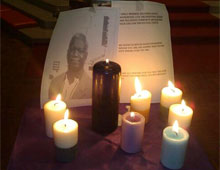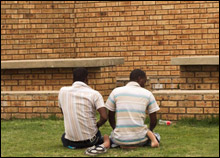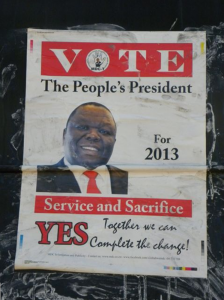
A battered campaign poster for Presidential hopeful, Morgan Tsvangirai, in an election that left the opposition bruised and disempowered
‘It’s a paralyzing election result to every one, the future is bleak. They will continue to fill their bellies, while we suffers.’ [Old man, Lupane]
‘I am glad that ZANU PF has won – they have promised us that we can own factories now, so I am waiting to be given part of a factory.’ [Young man, Tsholotsho South]
The 2013 election marked the end of the five-year Inclusive Government in Zimbabwe. The result astounded many, with ZANU PF winning almost 80% of the parliamentary seats. The MDC-T immediately cried foul, citing a host of irregularities including the impact of memories of the violence of 2008, fuelled by ZANU PF threats, and the numbers of voters who were forced to make ‘assisted’ votes, effectively denying them a confidential vote. The shadowy role played by Israeli polling experts remains at the centre of debate.
This report reviews the main political events of the last five years, in particular the constitutional reform process and the continued mediation of SADC. The shift in socio-economic landscape to benefit and entrench ZANU PF is outlined as a key element in their recent election win, as they have moved to embrace and control the peri-urban areas and the informal mining sector with a combination of repressive coercion and material benefits. (Read more…)
Sun, October 6 2013 » 2013, Elections, Reports » Leave a comment
By David Moore. David Moore’s 1990 York University (Canada) Phd examined the history of Zimbabwe’s liberation war: the contradictions continue still. Now Professor of Development Studies at the University of Johannesburg, while on sabbatical he is Visiting Scholar at UCT’s Centre for African Studies. This is an altered version of an August 9 OpenCanada.org publication.
August 1 6:08: from inside a party meeting assessing the damage, the SMS from the Movement for Democratic Change-Tsvangirai activist could not have been more different than his “WE HV WON” after Zimbabwe’s March 2008 election. “Bad news” wrote the man who was in seventh heaven at the country’s biggest ever political rally two days before: “We hv bn hit by the unexplainable. Its game over. 5 years with Mugabe again”.
The MDC-T’s hopes for a ‘crossover’ peaked at the rally (twenty per cent being registered, opined one senior observer: I trust that the young fellow who pickpocked me was one of the unregistered masses!). The real crossover contrasted starkly to the hopes of the MDC-T, its civil society supporters, and democrats the world over. It marked a fundamental transformation in Zimbabwe’s polity and social order nonetheless.
The results were soon in: ZANU-PF’s 62 to 34% victory over Zimbabwe’s main opposition in the presidential race and an over two-thirds parliamentary majority guarantee ‘revolutionary party’ power for the next five years. Many words have been spilled saying that this will be Robert Gabriel Mugabe’s last term as president, but it should not be forgotten that after 2005’s elections he said he’d rule until he was a century old. Constitution makers may have stopped this: two terms, up to 10 years, is the limit. Biology willing, the need to maintain a faction-ridden ZANU-PF could stretch his years in power to 99. (Read more…)
Wed, September 4 2013 » 2013, Elections, Zimbabwe Review » Leave a comment
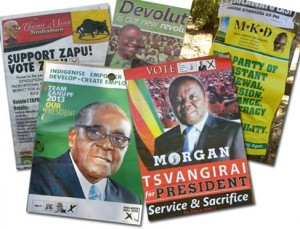
By Brian Raftopoulos
As Zimbabwe’s elections on 31 July approach, the Southern African Development Community is under pressure to complete its mandate from 2007.
In September 2008 the three major political parties in Zimbabwe entered an inclusive government following a contested election in June that year. The Global Political Agreement (GPA), as it was called, was facilitated by the Southern African Development Community (SADC), and the facilitation was led by the South African government.
After nearly five years under a very problematic and intensely contested inclusive arrangement, the people of Zimbabwe face another election on the 31st July in a battle for the presidency, parliament and council representatives. The setting of the election date was announced unilaterally by President Mugabe, following a decision by the constitutional court clearly directed by Mugabe’s party. (Read more…)
Mon, July 29 2013 » 2013, Elections, Zimbabwe Update » Leave a comment
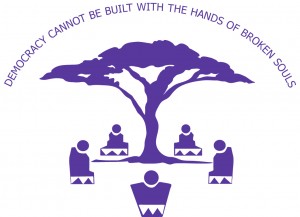 By Brian Raftopoulos, Solomon Mungure, Nicky Rousseau and Masheti Masinjila. The authors are part of the Violence and Transition Project in Zimbabwe, Kenya and South Africa funded by the IDRC.
By Brian Raftopoulos, Solomon Mungure, Nicky Rousseau and Masheti Masinjila. The authors are part of the Violence and Transition Project in Zimbabwe, Kenya and South Africa funded by the IDRC.
The recently concluded elections in Kenya against the background of the electoral violence of 2007, the anticipated election in Zimbabwe in 2013 with the memory of state led electoral violence in 2008 still fresh in the memory of the electorate, and the proclivity for state violence in South Africa witnessed in the Marikana killings, all point to different but connected legacies of violence in these countries.
Kenya, Zimbabwe and South Africa are three former British settler colonies where between 1963 and 1994 the countries witnessed the coming of independence and the end of white settler rule. However the forms of violence that characterised both colonial rule and the anti-colonial struggles in those countries have continued to haunt their political and everyday life. Thus the Mau Mau period in Kenya, the dominantly guerilla war in Zimbabwe and the widespread urban resistance and more limited armed struggle of the South African liberation movements have found continuing echoes in the contemporary violence in these countries. (Read more…)
Fri, July 19 2013 » 2013, Elections, Zimbabwe Review » Leave a comment
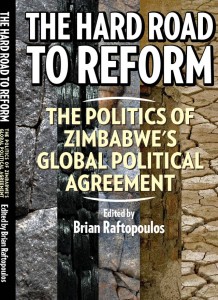
Hard Road to Reform
Reviewed by Timothy Scarnecchia: Associate Professor of History at Kent State University and author of The Urban Roots of Democracy and Political Violence in Zimbabwe: Harare and Highfield, 1940-1964 (University of Rochester Press, 2008). First published on African Arguments.
As Zimbabwe’s first post-GPA harmonised elections fast approach (July 31st), informed and not so well informed commentators will be giving their views of the campaigns, the elections, and the results. If the international coverage of the Kenyan 2013 election is any indication, the room for hyperbolic claims and dubious background coverage will once again be larger than the square footage of Robert Mugabe’s mansions (and now even Morgan Tsvangirai’s home). In order to avoid such mistakes, I highly recommend a collection edited by Professor Brian Raftopoulos, who is Director of Research and Advocacy in the Solidarity Peace Trust, an NGO dealing with human rights issues in Zimbabwe. (Read more…)
Tue, July 16 2013 » Press Releases » Leave a comment




